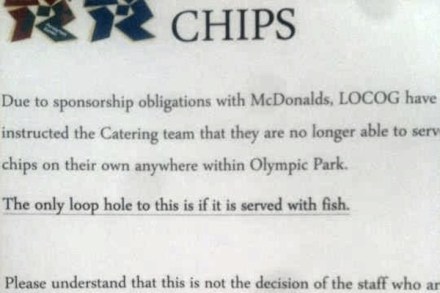The censorship Olympics
The Olympics may just 16 days away but will the spectators be able to find chips? The shocking picture above shows the real effect of the Censorship Olympics. Thanks to a lucrative sponsorship deal with McDonalds, all other catering teams are forbidden from serving chips anywhere within the area of London categorized as Olympic Park — unless they come with fish. The Soviet-style roadlanes are bad enough, but the right to sell a bag of chips to anyone who wants one is fairly fundamental in Britain — and Nick Cohen writes the cover story tomorrow on how many other fundamental rights have been flogged to the IoC and their sponsors.















